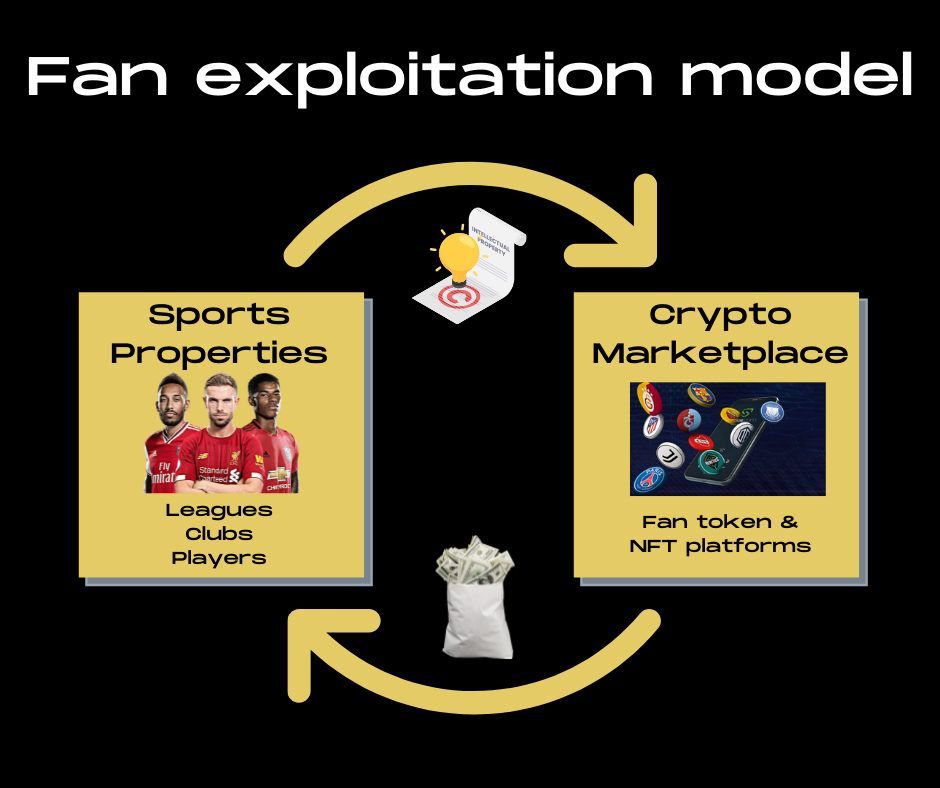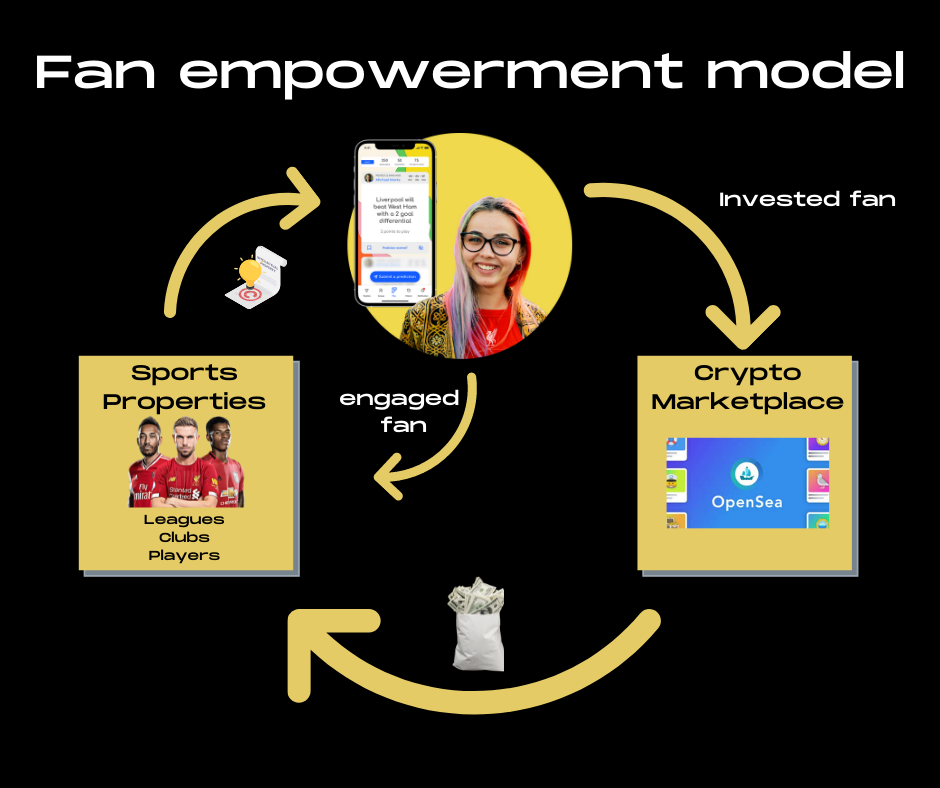There are plenty of reasons to be skeptical about crypto in sports.
The Fan token platform IQONIQ just collapsed. Many NFTs licensed by sports brands auction for astronomical prices. At the same time, NFT scammers and snake oil salesmen are endemic: the largest NFT marketplace recently admitted that 80% of items in its store made with its free tool were fakes, imitators, or spam.
It begs the question: Why bother? Weren’t we happy with the world before blockchain-based trading cards and $PSG tokens?
Well…maybe not.
There is a real and important problem: Fans are getting further removed from the sports they loved. Exhibit A: The Super League fracas in football (AKA soccer), following decades of criticism that big money is ruining the game. Disillusionment makes a bag problem worse: Younger fans are less and less interested in sports, which threatens viewership ratings and the value of broadcasting rights—the lifeblood of the industy—are already in sharp decline.
Until now, crypto has provided all the wrong solutions. Fan tokens and NFTs like John Terry’s notorious baby apes leverage goodwill towards famous sports brands to extract quick profits from supporters.
Yet despite what we’ve seen during the gold rush of crypto’s early days, there is a compelling case to be made for NFTs. Done right, they could bridge the gap between sports brands and fans.
The rise of the “Fan Exploitation Model” in crypto
First…let’s take a look at what’s gone wrong.
The first big player in sports crypto has been Socios.com, which has launched fan tokens for over 120 sports franchises including PSG, Manchester City, Juventus, and FC Barcelona. Raking in millions for clubs and leagues, it’s been so successful that it’s now spreading to new sports in 2022, forging agreements with UFC, NHL, and the NBA.
Socios’s winning formula has been to entice soccer fans to buy its own cryptocurrency, Chiliz ($CHZ), in order to buy fan tokens for various clubs. Socios issues these tokens, such as $PSG, in tranches and splits earnings with clubs 50/50. In return, fans get to vote on matters such as the song that plays before a game. Clubs and leagues, who have suffered financially during the pandemic, cannot resist the temptation of this free money.

While Socios markets this as a “loyalty program,” it’s nothing of the sort. Yes, fans get to vote on trivial decisions like the design on a team bus or which song is played at halftime. But talk to any of their customers, and they’ll tell you these tokens represent a form of investment or stake in the club.
That perception couldn’t be further from the reality, with token prices fluctuating wildly, correlating neither to the performance of teams nor to the sentiment of fans. It’s really just a new form of unregulated gambling, subject to market manipulation by financial speculators and Socios itself, which controls the token supply.
https://twitter.com/uglygame/status/1396734808403890177
This is why we call this a “fan exploitation model:” supporters are mined for their capital in exchange for opaque, potentially worthless assets.
Did you say “worthless"?
Like IQONIQ, which recently shuttered its token business after defrauding sports brands and fans alike, the value of Socios’s tokens could go to zero anytime. The entire industry could be shut down by regulators, should they determine that these companies are misleading consumers.
In the absence of a major collapse or regulatory crackdown, clubs continue to relish the revenue generated by these tokens, and fans—even many of those who have bought into the tokens—are left with a vague, uneasy sense that something is wrong.
Pet Berisha, a journalist covering the intersection of crypto and sports, explains how this is a departure from traditional methods of monetizing fan loyalty:
At the same time, this is just another way that big sports franchises are trying to profit from their consumers. Mugs, jerseys, memorabilia and more - but now we’re moving to the digital version of these, right?
Well…maybe not. These tokens can also be traded on secondary markets and can have great volatility meaning fans or buyers can lose (or gain) lots of money by trading them. Again, you can of course do this with sporting memorabilia - but not with the same liquidity.
Where crypto can do good
While Berisha says he’s “not convinced by the current state of fan tokens,” he believes there may be many useful applications if they put fans first. Crypto has many advantages as a marketing tool that can bolster fan loyalty and delight fans, such as rewarding game attendees with NFT airdrops.
These new digital collectibles are much easier to distribute to fans. The NFL has already begun issuing NFTs to ticketholders, a modern take on the ticket stub souvenir that’s easily traded on secondary markets.
https://twitter.com/FTX_Official/status/1451311173111058433
There are other ways the unique properties of crypto to give back to fans. Our team is working on one idea.
The “Fan Empowerment Model”
FlipFam allows fans to win NFTs for free, by using their time and expertise to engage with sports properties in a simple prediction and trivia game. The player assumes no risk, investing only their time and expertise in playing.
NFT rewards can include licensed IP from clubs as well as real-world use value, such as access to experiences, loyalty programs, or merchandise. Rewarding your fans for engagement is a powerful marketing tool for the sport. But it’s also a way of empowering fans financially. NFT winners can sell these NFTs in marketplaces like OpenSea.
Thanks to something called smart contracts, the proceeds of these sales can be split between the seller, artist, and any licensees. Any time the NFT is sold, automatic payments are made to each party.
In this model, sports properties are incentivized to create real value for fans. If they are successful, fans, sports properties, and sports artists will get revenue from NFT sales. This financial alignment could build deep loyalty, increase fan engagement, bring fans closer to their sport than ever before.

This is an entirely new experiment in a rapidly evolving space. We hope sports franchises will embrace it, and you’ll see NFTs with benefits like season tickets, unique fan experiences, and merchandise soon.
Fan tokens are exceedingly good business for sports franchises right now, but there could be serious costs if they don’t make a change. If regulators clamp down or token prices collapse, there will be reputational damage for clubs. With new, more demanding audiences to bring onboard, is it worth the gamble?

Thanks to Albert Wenger, whose essay, ‘Web3/Crypto: Why bother?’ was the inspiration for the title and contents of this article. For those interested in reading more about Socios, sports journalist Martin Calladine has compiled a very thorough list of resources.
Visit FlipFam.app to find out more about our game.